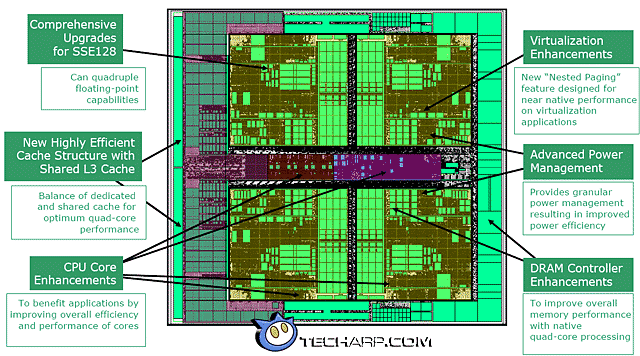True Quad-Core
The new Barcelona core does not only boast four processing cores, it also has a myriad of other architectural enhancements over the current Opteron processor. It also boasts some advantages over Intel's Core 2 processors. For one thing, it is a monolithic design, unlike Intel's quad-core solutions which are really two dual-core dies slapped into a single package.
AMD has been making a lot of noise about that actually. They are saying that their monolithic "true quad-core" design is far superior to Intel's hack job. Well, of course, a monolithic design is a superior design. There's no denying that the closer integration would result in better performance. However, the bigger question is whether this monolithic design will give AMD a significant advantage over Intel's rough-and-ready method.
The elegance of a single die design is not without its cost. The resulting processor die will be large, making each processor much more difficult and expensive to make. Damage to even a single working core renders the processor worthless (at least as a quad-core processor). Yield rates are expected to be low, although AMD claims supply of these new quad-core Opterons will not be an issue.
Intel's method may not be as elegant, but it is easier and cheaper for them to make two small dual-core dies than one large quad-core die. In addition, it's much easier to match two fully-working dual-core dies to make a quad-core processor, than to make a quad-core processor with all cores in working condition. They may not win the processor design contest, but this production method allows them to produce large numbers of quad-core processors cheaply and easily.
With that said, even Intel is moving towards a monolithic design. Evidently, AMD isn't wrong about going monolithic. Only time will tell whether they made the right decision pushing for a fully monolithic design, instead of opting for a faster and cheaper interim dual-core combination like Intel. As far as consumers are concerned, we only want to know if there's ultimately a significant performance advantage going with the new AMD Opteron. Processor design differences are nice to know, but they really don't matter much to the end-user.
Other Enhancements
Of course, AMD isn't going to rely only on their true quad-core advantage. The Barcelona will have a host of enhancements like a wider 128-bit SSE processing path, which can double to quadruple the processor's floating point performance. It also boasts a new cache structure which combines both shared and dedicated caches, including an L3 cache. AMD claims this new cache structure is far superior to the shared cache used in Intel's Core 2 processors. We will take a closer look at that claim in the next page.

AMD also claims that the new Barcelona-based processors will feature advanced virtualization enhancements that will allow the processor to offer near-native performance with virtualization applications. This includes more hardware-based features like "nested paging", something AMD says you will not find in Intel processors. These hardware virtualization features will be of great interest to server and workstation users and should give AMD an advantage in that market.
To show that they are really serious about saving power (and doing their part in saving Earth from global warming), the new quad-core Opterons will have better power management features. The Barcelona-based processors will boast significantly higher performance-per-watt ratios. In fact, AMD claims these quad-core processors will have about the same power consumption and thermal output as the current dual-core Opteron processors.
<<< AMD Opteron (Barcelona) Technology Report, Quad-Core AMD Opteron : Previous Page | Next Page : New Cache Structure, Monolithic Design Advantage >>>







 Add to Reddit
Add to Reddit
